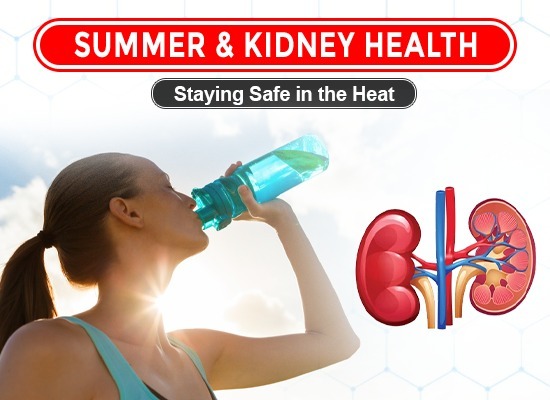Summer & Kidney Health: Staying Safe in the Heat
At Mukat Hospital & Heart Institute, our nephrology experts emphasize the importance of seasonal kidney care to prevent dehydration, urinary issues, and kidney stone formation during the warmer months.
Why Kidney Health Is More Vulnerable in Summer

High temperatures increase the risk of fluid loss through sweating, which can lead to dehydration. When the body lacks enough fluids, kidney function can slow down, and toxins may start building up in the body. Even individuals with healthy kidneys can face issues if they do not stay properly hydrated.
Some of the most common kidney-related issues that spike during summer include:
- Dehydration
- Kidney stones
- Urinary tract infections (UTIs)
- Electrolyte imbalances
- Acute Kidney Injury (AKI)
People with Chronic Kidney Disease (CKD), diabetes, or hypertension are at even greater risk during hot weather and must take extra precautions.
Hydration Is the Key to Healthy Kidneys
- Aim for 8–10 glasses of water per day; more if you’re active or exposed to heat.
- Choose water and fresh fruit juices over sodas and caffeinated drinks.
- Don’t wait to feel thirsty—sip water throughout the day.
Beware of Summer Risks to Kidney Health
1. Kidney Stones
Warm temperatures can lead to concentrated urine, increasing the chances of mineral buildup and stone formation.
- Stay well-hydrated throughout the day.
- Limit high-sodium foods, animal proteins, and oxalate-rich items like spinach, beets, and nuts.
- Cut down on soft drinks containing phosphoric acid.
2. Urinary Tract Infections (UTIs)
Dehydration can result in less frequent urination, allowing bacteria to multiply in the urinary tract.
Prevention Tips:
- Drink enough fluids to urinate regularly.
- Practice good hygiene.
- Avoid delaying urination for long periods.
3. Heat Stress and Acute Kidney Injury
Prolonged exposure to heat without adequate hydration can lead to sudden kidney stress or even injury.
- Fatigue, confusion, low urine output, and swelling.
- Seek medical help if these symptoms appear.
Smart Eating for Summer Kidney Care
- Fresh fruits like apples, papayas, grapes, and watermelons
- Vegetables like bottle gourd, ridge gourd, and zucchini
- Coconut water in moderation for natural electrolytes
- Homemade buttermilk and lemon water without salt
- Processed snacks high in salt
- Canned and packaged foods
- Sugary and carbonated beverages
- Excess red meat or heavy proteins
Summer Care Tips for Kidney Patients
People with chronic kidney conditions or those on dialysis should be particularly careful during the hot season. Even minor dehydration or dietary mistakes can lead to complications.
For CKD Patients:
- Monitor fluid intake and avoid overconsumption.
- Keep a regular check on blood pressure and creatinine levels.
- Avoid over-the-counter painkillers unless prescribed.
- Take medications on time and as directed.
For Dialysis Patients:
- Follow fluid and salt restrictions to avoid fluid overload.
- Ensure dialysis solutions are stored correctly and not exposed to heat.
- Attend all scheduled dialysis sessions—do not skip even during travel.
Supporting Kidney Health Holistically
Additional Tips:
- Avoid strenuous activities during peak sun hours (11 AM to 4 PM).
- Stay indoors or in cool environments during extreme heat.
- Wear light-colored, breathable clothing.
- Include gentle exercises, like stretching or indoor yoga.
- Get 7–8 hours of restful sleep each night.
- Manage stress through deep breathing, meditation, or light walks.
Mukat Hospital: Your Trusted Partner in Kidney Care
- Early diagnosis and management of kidney disorders
- Hemodialysis and peritoneal dialysis
- Kidney stone treatment
- CKD and hypertension management
- Nutritional counseling for kidney-friendly diets
Conclusion
At Mukat Hospital, we encourage everyone to be proactive about their health—especially in the summer months. Don’t ignore early warning signs like dark-colored urine, fatigue, or swelling. With the right knowledge and expert care, your kidneys can stay strong and healthy all season long.












